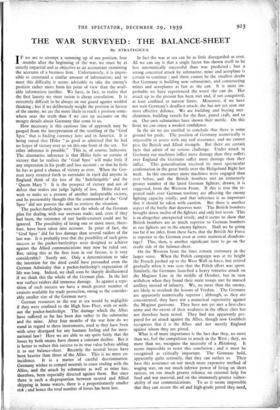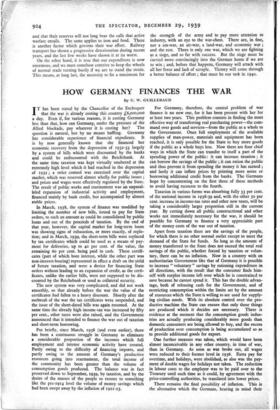THE WAR SURVEYED : THE BALANCE-SHEET
By STRATEGICUS
F we are to attempt a summing up of our position, four 1. months after the beginning of the war, we must be as strictly impartial and as objective as an accountant examining the accounts of a business firm. Unfortunately, it is impos- sible to command a similar amount of information; and to meet this difficulty it seems advisable to take the enemy's position rather more from his point of view than the avail- able information justifies. We have, in fact, to realise that the first luxury we must ration is cheap consolation. It is extremely difficult to be always on our guard against wishful thinking ; but if we deliberately weight the position in favour of the enemy, we are the more likely to reach a position some- where near the truth than if we cast up accounts on the meagre details about Germany that come to us.
How necessary is this cautious line of approach may be gauged from the interpretation of the scuttling of the ' Graf Spee ' that is finding currency here and in America. It is being stated that Hitler " as good as admitted that he had no hopes of victory over us on this one front of the sea. No other inference is possible." This is, of course, ludicrous. The alternative inference is that Hitler feels so certain of victory that he realises the ' Graf Spee ' will make little if any impression in his profit and loss account ; or that he feels he has as good a chance of victory as ever. When the Ger- man navy steamed forth to surrender in 1918 did anyone in England think of the loss of the ' Indefatigable' and the Queen Mary '? It is the prospect of victory and not of defeat that makes one judge lightly of loss. Hitler did not wish to make us a present of another indisputable victory, and he presumably thought that the commander of the ' Graf Spee ' did not possess the skill to retrieve the situation.
The pocket-battleships were not the whole of the German plan for dealing with our overseas trade; and, even if they had been, the existence of our battle-cruisers could not be ignored. The possibility of losing one or more must, there- fore, have been taken into account. In point of fact, the ' Graf Spec' did far less damage than several raiders of the last war. It is probably true that the possibility of such gross success as the pocket-battleships were designed to achieve against the Allied communications may now be ruled out. But, taking this as the first item in our favour, is it very considerable? Surely not. Only a determination to take the intention for the deed could have persuaded even the German Admiralty that a pocket-battleship's expectation of life was long. Indeed, we shall soon be sharply disillusioned if we think this the whole of the German plan. In the last war surface raiders did immense damage. As against a repe- tition of such success we have a much greater number of cruisers available for trade protection, owing to the consider- ably smaller size of the German navy. German resources in the war at sea would be negligible if they were confined to the High Seas Fleet, with or with- out the pocket-battleships. The damage which the Allies have suffered so far has been due rather to the submarine and the mine. After four months of the war how do we stand in regard to these instruments, used as they have been with utter disregard for any humane feeling and for inter- national law? Here we are able to say quite fairly that the losses by both means have shown a constant decline. But it is better to reduce this success to its true value before adding it to our balance-sheet. Recently the neutral losses have been heavier than those of the Allies. This is no mere co- incidence. It is a matter of careful discrimination. Germany wishes to compel neutrals to cease trading with the Allies, and the attack by submarine as well as mine has, therefore, been especially directed against them. But since there is such a disproportion between neutral and Allied shipping in home waters, there is a proportionately smaller risk ; and hence the total number of losses has been less. In fact the war at sea can be as little disregarded as ever. All we can say is that a single factor has shown itself to be less automatically successful than was predicted ; but a strong concerted attack by submarine, mine and aeroplane is certain to continue ; and there cannot be the smallest doubt that Germany is building new submarines, and constructing mines and aeroplanes as fast as she can. It is most im- probable we have experienced the worst she can do. Her attack up to the present has been met and, if not conquered, at least confined to narrow limits. Moreover, if we have not seen Germany's deadliest attack, she has not yet seen our most effective defence. We are building and buying mer- chantmen, building vessels for the fleet, patrol craft, and so on. Our own submarines have shown their mettle. On this front we can enjoy a modest confidence.
In the air we are entitled to conclude that there is some ground for pride. The position of Germany numerically is impossible to assess with any real assurance, and we cannot give the British and Allied strength. But there arc certain facts that admit of no serious challenge. Under attack in Germany our machines inflict more damage than they suffer; over England the Germans suffer more damage than they inflict. This generalisation received its most spectacular confirmation in the great battle over the Heligoland Bight last week. In this encounter more machines were engaged than ever before, and the British bombers met an immensely greater number of the latest German fighters, drawn, it is suggested, from the Western Front. If this is true the re- peated raids over German territory are affecting the enemy fighting capacity vitally; and that inference is so important that it should be taken with caution. But there is another aspect of the battle that deserves note. The British bombers brought down twelve of the fighters and only lost seven. This is an altogether unexpected result; and it seems to show that British bombers are as much superior to German bombers as our fighters are to the enemy fighters. Shall we be going too far if we infer, from these facts, that the British Air Force is superior to the German even at some numerical disadvan- tage? This, then, is another significant item to go on the credit side of the balance-sheet.
On the Western front the lines remain stationary in the larger sense. When the Polish campaign was at its height the French pushed up to the West Wall in force, but retired gradually when it was seen that the Polish effort was spent. Similarly, the Germans launched a heavy tentative attack on the Maginot Line in the middle of October, but in turn withdrew when they found their main troops met by massed artillery instead of infantry. We, no more than the enemy, are likely to overlook the lessons of Verdun. The Germans are apparently numerically superior ; although, as they are concentrated, they have not a numerical superiority against the Maginot garrisons. They have not yet met a first-class army and the extent of their weakness in the officer class has not therefore been tested. They had not apparently pre- pared for an attack against the Allies, though now Goebbels recognises that it is the Allies and not merely England against whom they are pitted.
What is of more importance is the fact that they, no more than we, feel the compulsion to attack in the West ; they, no more than we, recognise the necessity of a Blitzkrieg. It seems impossible to resist this conclusion ; and it must be recognised as critically important. The Germans hold, apparently quite seriously, that they can outlast us. They base this assurance on our much more expensive method of waging war, on our much inferior power of living on short rations, on our much greater reliance on external help for food and war material, and on the immensely greater vulner- ability of our communications. To us it seems impossible that they can secure the oil and high-grade petrol they need, and that their reserves will not long bear the calls that active warfare entails. The same applies to iron and food. There is another factor which governs their war effort. Railway transport has shown a progressive deterioration during recent years, and the last few weeks have shown it at its worst.
On the other hand, it is true that our expenditure is now enormous, and we must somehow contrive to keep the wheels of normal trade turning busily if we are to stand the strain. This means, at long last, the necessity to fix a maximum for the strength of the army and to pay more attention to industry, with an eye to the war-chest. There are, in fine, not a sea-war, an air-war, a land-war, and economic war ; and the rest. There is only one war, which we are fighting as a siege, and so far with success. But the siege must be carried more convincingly into the German home if we are to win ; and, before that happens, Germany will attack with all her force and lack of scruple. Victory will come through a better balance of effort ; that must be our task in 1940.































 Previous page
Previous page